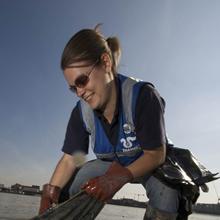"When the well is dry, we learn the worth of water" Benjamin Franklin
780 million people globally lack access to clean water, while our seas are threatened by pollution and overexploitation.
This pathway explores the interaction between humans, water and aquatic environments, so our graduates understand about the management of these precious resources.
Students focus on the biological, chemical, physical and management aspects of water in the environment. Aspects of aquatic environments and water-related resources, and our relationship with them, are covered through a diverse range of modules encompassing hydrology, geomorphology, oceanography, aquatic ecology and river management.
Students can develop their knowledge of both freshwater and marine environments (focussing on one if they wish), combined with the study of water as an essential resource.
Year 1
Core Programme Modules (on all pathways)
Environmental Science: Concepts and Communication
Environmental Science: Research and Applications (field/practical module)
Compulsory pathway modules
Introduction to marine ecology
Environmental Field Techniques and Applications
Year 2
Core Programme Modules (on all pathways)
Environmental Impact Assessment
Geographic Information Systems (GIS) for Environmental Scientists
Environment and Sustainability
Compulsory pathway modules
Optional modules
Environmental Chemistry 1: Aquatic Chemistry
Global climate change: science, impacts and policy
Coastal and estuarine oceanography 1
Coastal and estuarine oceanography 2
Pure and applied population ecology
Remote sensing for earth observation
Phytoplankton and primary production
Introduction to energy in the environment
Coastal Landscapes and Human Interactions
Concepts and Methods for Environmental Management
Business Skills for Employability
The Management of Risk and Uncertainty
Year 3
Core Programme Modules (on all pathways)
Environmental Law and Management
Advanced Quantitative Methods (MEnvSci only)
Environmental Field Studies (MEnvSci Only)
Optional modules
Sustainable Resource Management
Water & Wastewater Engineering 1
Air Quality and Environmental Pollution
Complex socio-ecological systems: past, present and future
Zooplankton ecology and processes
Biogeochemical cycles in the earth system
Global change biology: from molecules to ecosystem services
The Sustainability Professional
Teaching and Communication and the UG Ambassador Scheme
Year 4 (MEnvSci only)
Core Programme Modules (on all pathways)
Work Based Learning (work placement)
Optional modules
Air Quality and Environmental Pollution
Environmental Management Systems
River and fisheries restoration
Energy resources and engineering
Biogeochemical cycles in the earth system
Environmental radioactivity and radiochemistry
Coastal and maritime engineering and energy
Water and waste water engineering 2
What's related

I believe it was the firm foundations and expert help and support provided by the University of Southampton that helped me get started in my career.

I am River Programmes Co-ordinator for Thames21, an environmental charity which works with volunteers across London to improve London’s waterways.